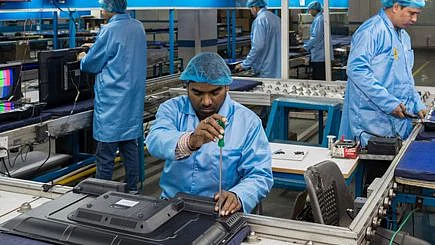It's easy to see why an extended lockdown due to COVID-19 will bring the economy to a complete halt. While the Prime Minister has asked companies to keep paying salaries to their employees, companies are under pressure to somehow manage costs with a complete freeze on manufacturing and sales.
Something has got to give.
For example, take the case of a television maker based in the Delhi-NCR region. Videotex International is a company that has a manufacturing capacity of around 1 million television sets a year and supplies it to around 25 domestic and international brands. It also has an in-house brand called Daiwa.
While the entire assembly process takes place domestically, the raw material and main components for the TV are now stuck at warehouses. Each day, many companies have to pay heavy demurrage (Rs 13,000 on average per shipment per day) just to store the components with no facility to ship them out.
When the first phase of lockdown started the government had released an advisory that for any shipment from 23 March onwards 50 percent of demurrage charges would be waived off if the material is cleared by 14 April.
Post 14 April, there has been no order for such a waiver and demurrage continues to be charged to companies.
The TV manufacturing industry is asking why they need to even pay 50 percent demurrage when they aren’t in a position to manufacture or in a position to transport material.
“A lot of associations have already raised their voices. But no confirmation has come from the government. We are hoping that the government will waive off these charges and also return the demurrage that many companies had to pay. That’s the current situation.”Arjun Bajaj, Director, Videotex
There is a cashflow issue.
Payments from clients are due and payments to vendors have to be made. It is difficult to sustain paying salaries when production is halted. Companies now want the government to step in with some sort of relief fund or package to help companies pay salaries.
“The government is pushing us to pay 100 percent salaries to employees, but it would be good if they can come out with a bill saying just pay a certain percentage that is required for employees to run their household. For the rest they can put in some money or offer some tax benefit.”Arjun Bajaj, Director, Videotex
Bajaj goes on to point out that in countries like the US and Canada they have taken out schemes where every employee who has lost his or her job gets a certain amount of cash so that their household can run properly. He wants the Indian government to do something similar or at least bear a part of the burden.
"It's good that we were one of the first countries to implement a full lockdown early to flatten the curve, but the financial implications also need to be taken care of," says Bajaj.
Some states have already asked the centre to extend lockdown by a further two weeks from 4 May. This would have far-reaching implications on both sides, as that means a further delay in GST collections for the government and further delay in goods production beginning.
Fitch Ratings sees India’s overall growth dropping to just 0.8 percent in this financial year compared to 4.9 percent in the previous year.
In terms of reviving the economy, where is GST going to come from if a company doesn’t survive? The government has to make sure it pumps in some money now, so that it can recover it from GST later.Arjun Bajaj, Director, Videotex
An extended lockdown could see some small and medium companies shutting down. If companies shut down, it isn't going to do the economy any good. To save the economy the government will have to invest right now by means of tax waivers or relief packages and maybe get their returns through GST and tax collections later. Even a tax holiday would be welcome.
Any move that could help companies save on cost and help kickstart the economy would be welcome. Anyone listening?
(At The Quint, we question everything. Play an active role in shaping our journalism by becoming a member today.)
